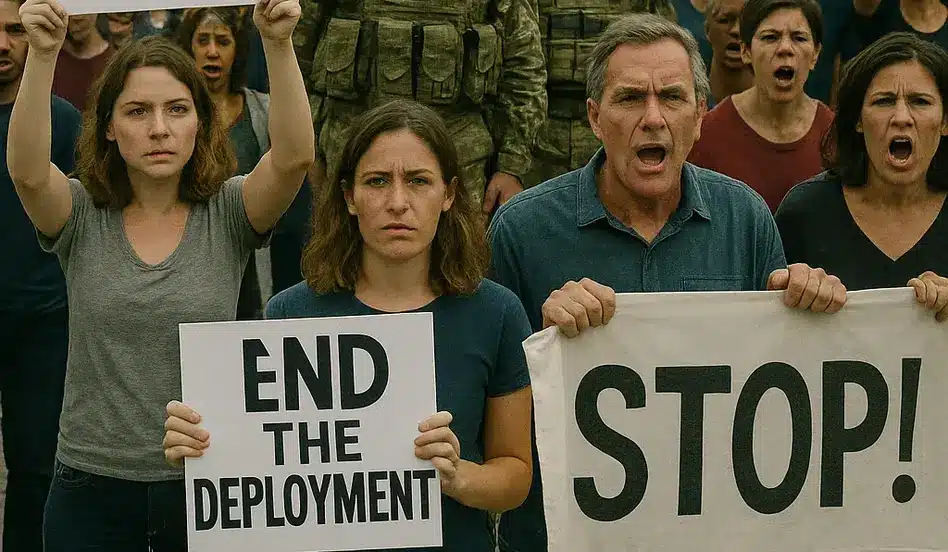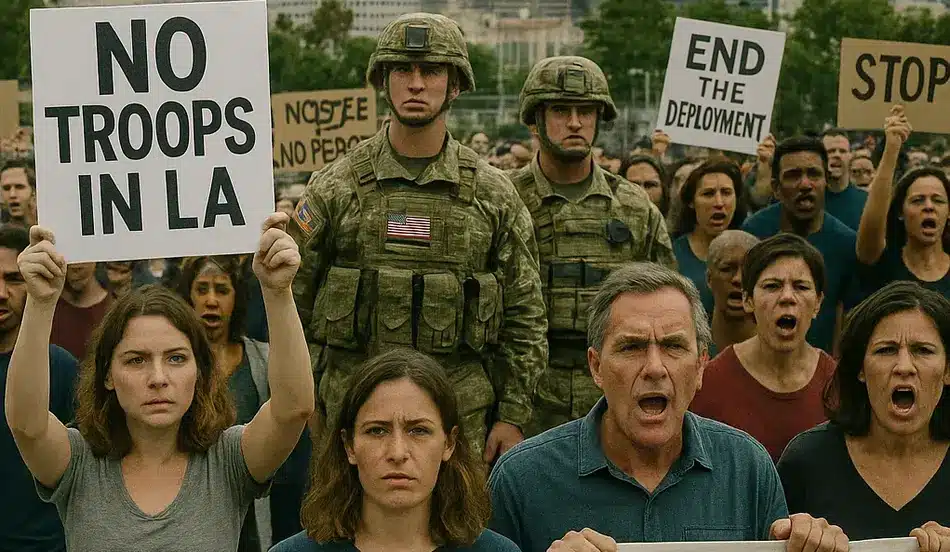The deployment of Federal Troops in Los Angeles has triggered a nationwide crisis, with protests erupting across major cities. The presence of federal military personnel in Los Angeles marks a significant escalation in the ongoing standoff between local and federal authorities. As the situation unfolds, the phrase Federal Troops in Los Angeles has become a rallying cry for both supporters and opponents of the intervention.
Mayor Bass Condemns Federal Intervention
Los Angeles Mayor Karen Bass issued a strong condemnation of the Federal Troops in Los Angeles, calling the move an “unprecedented overreach” by the federal government. In a press conference, Mayor Bass stated, “The deployment of federal troops in Los Angeles undermines our city’s autonomy and threatens the safety of our residents.” Her remarks have been echoed by city officials and community leaders alike.
Escalating Federal Presence: Marines Join the Scene
The initial deployment of Federal Troops in Los Angeles has now expanded to include units from the U.S. Marines. Eyewitnesses report convoys of military vehicles moving through downtown Los Angeles, with heavily armed personnel establishing checkpoints. According to CNN’s Nick Watt, the number of federal troops in Los Angeles has surpassed 2,000, with additional reinforcements expected.
Constitutional Crisis: Governor Newsom Responds
California Governor Gavin Newsom has declared the situation a “constitutional crisis,” arguing that the deployment of Federal Troops in Los Angeles violates state sovereignty. In a televised address, Newsom warned, “This is not just about Los Angeles. This is about the future of federalism in America.” Legal experts point to the Posse Comitatus Act, which restricts the use of federal military forces in domestic law enforcement, as a key issue in the unfolding drama.
Political Implications: A Divided Nation
The arrival of Federal Troops in Los Angeles has deepened political divisions nationwide. Supporters argue that federal intervention is necessary to restore order, while critics see it as an attack on civil liberties. Both major parties are using the crisis to rally their bases ahead of the upcoming elections, with heated debates dominating cable news and social media.

On the Ground: CNN’s Nick Watt Reports
Reporting live from the scene, CNN’s Nick Watt described a tense atmosphere as Federal Troops in Los Angeles conducted mass arrests and enforced curfews. “The city feels like it’s under siege,” Watt reported, noting that over 300 people have been detained in the last 24 hours. Military helicopters circle overhead, and armored vehicles patrol the streets, creating an environment of fear and uncertainty.
Legal and Operational Concerns
Legal analysts, including John Miller, have raised serious concerns about the use of Federal Troops in Los Angeles for law enforcement purposes. Miller explained that the Posse Comitatus Act is designed to prevent exactly this kind of military involvement in civilian affairs. Operationally, coordination between federal troops and local police has been fraught with confusion, leading to conflicting orders and public safety risks.
Broader Constitutional Implications
The deployment of Federal Troops in Los Angeles raises profound questions about the balance of power between state and federal governments. Constitutional scholars warn that this precedent could erode the principle of federalism and open the door to future interventions in other states. The ongoing debate centers on the limits of executive authority and the protection of civil rights.
Historical Context: National Guard Deployments
Historically, National Guard units have been deployed in response to civil unrest, but the use of Federal Troops in Los Angeles is far more controversial. Past incidents, such as the 1992 LA riots, saw the National Guard acting under state authority. The current situation is unique in that federal troops are operating independently of state control, raising alarms among historians and legal experts.
Community Impact: Los Angeles Residents React
The impact of Federal Troops in Los Angeles is being felt most acutely in immigrant communities, where fear of arrest and deportation is widespread. Community organizations report a surge in calls to legal hotlines and a sharp decline in public activity. Many residents are staying indoors, worried about being caught up in mass arrests or mistaken for protestors.
What Happens Next?
As the standoff continues, several scenarios are possible. The federal government could withdraw troops in response to mounting pressure, or the situation could escalate further, leading to more widespread unrest. Legal challenges are already underway, with the ACLU filing suit to block the continued presence of Federal Troops in Los Angeles. The coming days will be critical in determining the outcome of this unprecedented crisis.
External Resources
FAQ: Federal Troops in Los Angeles
Why were federal troops deployed in Los Angeles?
Federal troops were deployed in Los Angeles in response to escalating protests and civil unrest, with the stated goal of restoring order. However, the move has been widely criticized as an overreach of federal authority.
What legal issues are raised by the deployment?
The deployment raises significant legal concerns, particularly regarding the Posse Comitatus Act, which limits the use of federal military forces in domestic law enforcement. Lawsuits have already been filed challenging the legality of the intervention.
How has the community responded?
Community response has been overwhelmingly negative, especially among immigrant populations. Many residents fear arrest or deportation, and local organizations are providing legal support and resources.
What are the possible outcomes?
Possible outcomes include the withdrawal of federal troops, escalation of unrest, or a protracted legal battle over the limits of federal authority. The situation remains highly fluid and unpredictable.
For more information on employment opportunities and career advice, visit WhatJobs.




